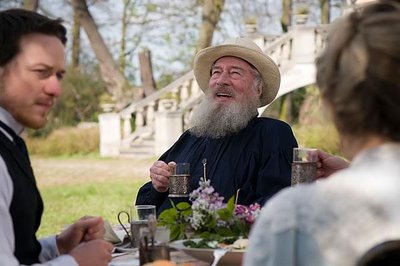
Leo Tolstoy, for those who will not recognize the name, is considered the world over to be one of the greatest writers ever to have lived. Even if you've never read Anna Karenina, War and Peace, or The Death of Ivan Ilyich, you can take it on good faith that this 19th Century Russian author laid an extraordinary and unmatched groundwork for the realist novel, the importance of comprehensive world-building, and the use of a truly omniscient narrator--one capable of both expansive objectivity and intimate, detail-oriented portraiture of all characters in its care.
Sadly, none of these achievements, and the great bevy of acclaim they won the author himself, protected Tolstoy's message from the distorting influences of time and community--which is why, in The Last Station, viewers find themselves thrust into a rights battle over Tolstoy's writings, as enacted between Vladimir Chertkov (Paul Giamatti) and Tolstoy's wife, Sofia (Helen Mirren) as Tolstoy (Christopher Plummer) enters the final months of his life.
What seems at first a simple matter--Chertkov wanting Tolstoy to will his works into the public domain; Sofia wanting the works' copyrights to remain with the family--is reflected by the strenuous idealism of young Valentin Bulgakov (James McAvoy), a fervent man moved by Tolstoy's work and keen to serve the egalitarian cause established on Tolstoy's estate; but both deceptively simple matters are quickly complicated by the same life principle: love.
On one level, then, The Last Station is an elegantly styled excerpting of Tolstoy's later life, carrying the viewer right up to his death and perhaps only lingering too long, too predictably, on the immediate emotional aftermath. In this way it is an absolutely "harmless" film, leaving a vague and fuzzy feeling of contentment among viewers, but intrinsically demanding little more.
But on another level, there is also tremendous room for debate seeded amid the light discourse of this film. By juxtaposing a tale of young love with old, and the routines of lovers with the routines of political combat; and by especially emphasizing the outsider status of anyone attempting to judge the merits of a relationship who is not in fact part of that relationship, the film easily arises at a much more profound argument for the impossibility of perfect communication.
Thus, as the film progresses, Chertkov's "mankind," the presumed benefactors of open copyright, becomes a little narrower in scope, while Sofia's "family," the people she claims to want to protect by keeping Tolstoy's works financially useful, broadens to stand in for a wide spectrum of identity politics. And though Tolstoy is no longer around to worry the issue by the film's end, the question remains long after the credits roll: If even our greatest thinkers and writers cannot control the message or the consequences of their words, are the rest of us in even greater peril of miscommunication--or does their failure instead speak to a universal condition, in which we are all blind men attempting to describe the great elephants of love and politics in the room?
If the latter, then it was perhaps Tolstoy's greatest gift, made elegantly manifest in this film written and directed by Michael Hoffman, that we should at least have the presence of mind to be aware of this difficulty, and to regard each other with compassion and humility accordingly.
That, or just make a lot of love to a lot of people while the getting is good. After all, in The Last Station, no one--not even Tolstoy himself--is as good a Tolstoyan as they at first might seem. But they certainly do try!
No comments:
Post a Comment